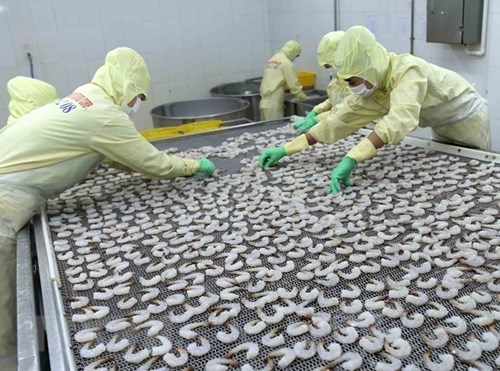He said seafood exploitation, preservation, processing and consumption should be based on demand of domestic and foreign markets, adding that fishing activities need to be re-organized.
Businesses should enhance processing to add value to their products. Meanwhile, the latest scientific and technological advances need to be utilised to develop aquaculture.
Pointing out problems in the fisheries sector, the minister said fishing activities have only developed in quantity instead of quality. While fishing vehicles and equipment are limited, seafood classification and preservation haven’t been done well.
    |
 |
|
Processing shrimp for export at the Minh Phu Seafood Corp |
The fisheries sector faces an array of challenges posed by climate change, international integration and the sector’s restructuring, Cuong added.
Data of the ministry’s Directorate of Fisheries show that aquatic exports reached USD 1.7 billion from January to March, up 11.5 percent from the same period of 2017.
The US, Japan, China and the Republic of Korea were the top importers of Vietnamese aquatic products in the first two months of 2018, accounting for 50.5 percent of Vietnam’s total aquatic exports. Notably, strong growth was recorded in shipments to the Netherlands (49.7 percent), Thailand (35.5 percent) and China (34.9 percent).
However, the fisheries sector encountered a major challenge in March when the US decided to levy high anti-dumping duties on shrimp and tra fish, two key export items of Vietnam. The directorate said this is a groundless decision and will cause difficulties for businesses since the US is a leading tra fish importer of Vietnam. Agencies are working to solve this problem.
Regarding the European Commission (EC)’s “yellow card” warning issued last September for Vietnam’s failure to progress in fighting IUU fishing, Minister Cuong said the country has been taking actions as suggested in the nine recommendations of the EC. It is striving to build a fisheries sector of sustainable development that is responsible and adheres to international regulations.
Deputy Minister of Agriculture and Rural Development Ha Cong Tuan said the EC agreed to send a delegation to assess the situation in Vietnam in late April or early May so as to consider whether or not the yellow card should be withdrawn.
Vietnam is satisfied with the strides it has made during the implementation of the EC’s recommendations recently. These are not temporary solutions, and the country will keep working to develop a sustainable fisheries sector, he added.
Source: VNA